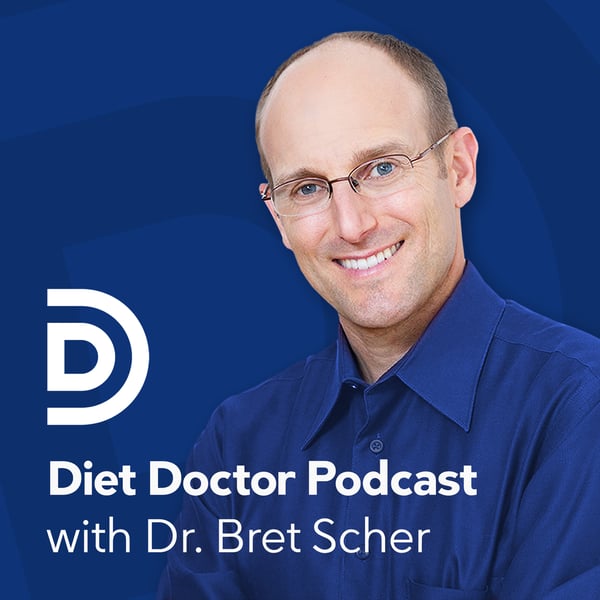#94 - Brain and weight gain
Diet Doctor Podcast
dietdoctorpodcast
4.8 • 711 Ratings
🗓️ 29 March 2022
⏱️ 56 minutes
🧾️ Download transcript
Summary
Transcript
Click on a timestamp to play from that location
| 0:00.0 | Welcome back to the Diet Doctor Podcast. I'm your host, Dr. Brett Schur. Today I'm joined by Dr. |
| 0:07.0 | Stefan Giena. Now, Stefan has a PhD in neuroscience from the University of Washington, where he also did his post-doctoral training. |
| 0:14.0 | And he sort of specializes in the neuroscience of weight gain and weight loss. And he's the author of the book, The Hungry Brain, which is really a comprehensive guide of how the brain affects weight gain and weight loss. |
| 0:26.7 | And you'll hear him say in the interview, he doesn't want to call it comprehensive |
| 0:29.1 | because that would mean it includes everything. |
| 0:32.5 | And he's sure there's things he left out. |
| 0:33.7 | And that says a lot about him and about his personality |
| 0:37.1 | and that he really does |
| 0:38.3 | want to focus on the science and speak very, in a very measured way about what the science |
| 0:43.1 | truly says and truly doesn't. He always wants to default back to the science and wants |
| 0:47.7 | to be very clear about when he's speculating, when he's hypothesizing or what the science |
| 0:51.9 | says. And so I think that statement of his really says a lot about his personality, which is something |
| 0:57.2 | I really respect. |
| 0:58.6 | You can find him at stephangeena.com and also on Twitter at W.H. Source. |
| 1:04.8 | And in this discussion, we really talk a lot about the neuroscience of why we gain weight |
| 1:10.4 | and really try and nail them down on some of the |
| 1:13.4 | practical tips of what we can do to help counteract the neuroscience right because there's this |
| 1:18.4 | environmental and genetic mismatch of the way we're wired and the environment we're in so we need |
| 1:24.9 | to find ways to overcome that and Really, a lot of it does come |
| 1:27.6 | down to this concept of satiety per calorie, getting the maximum satiety and fullness for the |
| 1:33.2 | minimum number of calories, or at least finding the balance where you're going to have a diet |
| 1:37.3 | that you're happy with, where you're hitting all your satiety and nutrition needs, but not |
... |
Please login to see the full transcript.
Disclaimer: The podcast and artwork embedded on this page are from dietdoctorpodcast, and are the property of its owner and not affiliated with or endorsed by Tapesearch.
Generated transcripts are the property of dietdoctorpodcast and are distributed freely under the Fair Use doctrine. Transcripts generated by Tapesearch are not guaranteed to be accurate.
Copyright © Tapesearch 2025.

